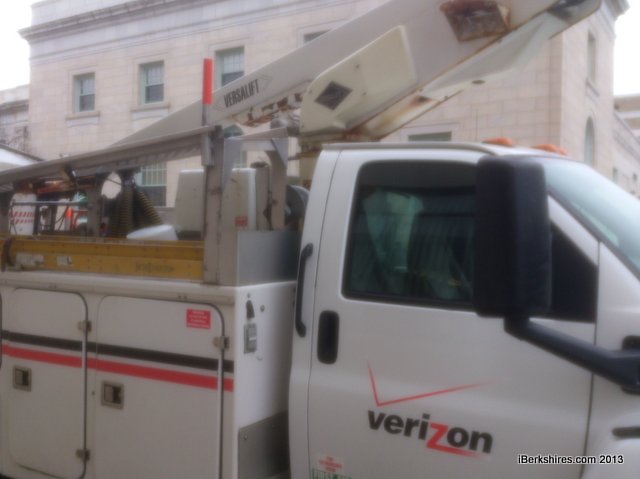Verizon Asks Legislature To Deregulate Cable, Phone
 Verizon is hoping the state will change land-line regulations. Verizon is hoping the state will change land-line regulations. |
PITTSFIELD, Mass. — Verizon is hoping the Legislature will reverse monopoly laws that the telecommunications company says puts it at a competitive disadvantage.
The company is lobbying for a bill, sponsored by Fitchburg state Rep. Stephen DiNatale, that would end the Department of Telecommunication and Cable's oversight of the company's land line services as well as guarantee the state won't add any regulations to federally regulated wireless service.
Joe Zukowski, the company's vice president of governmental affairs, said on Monday that the bill would reverse laws set in place when Verizon was the only provider.
In the last two decades, cable companies have begun providing phone services that don't fall under the copper wire, land-line regulations.
"We're the only ones in the marketplace that has to abide by these rules," Zukowski said. "It was designed when we were the only choice."
With increased competition and changes in the market, the company's land-line services have dropped from more than 4 million to 1.6 million in the last 20 years, he said. A series of state laws have encouraged competition, driving growth in cable and Internet sectors, he said. The company is using resources to keep in line with the monopoly laws the competition doesn't have to abide by.
Zukowski said the Verizon would rather invest in customer service and the overall network. The bill is intended to "recognize changes in the market" and update the rules to fit new technology.
"We've lost half of our landlines in Massachusetts," he said, adding that meanwhile "we have more wireless connections in Massachusetts than people."
However, in the Berkshires, there are still numerous communities where Verizon is the only choice. Zukowski said the bill includes provisions that the oversight will still exist where there is no competition.
"It's a reasonable approach. We're trying to recognize that competition hasn't come to all parts of Massachusetts," he said. "Those protections remain until another provider shows up."
An example of the service requirements includes Verizon having 24 hours to resolve non-working land line service, Zukowksi said.
In places like Pittsfield where there is competition, that response wouldn't be required, allowing the company to tailor their repairs to the customer. But in a place like Peru, the company would still be required to respond within 24 hours.
Despite the provision for rural areas, Berkshire legislators are skeptical of the bill.
"Overall I am fairly skeptical of the proposal," said state Sen. Benjamin Downing. "I think we still have many questions to ask."
Downing chairs the state's Energy and Telecommunications Committee, which recently held a hearing on the bill. He is concerned with the deregulation of land line services and questions how competition will be determined.
State Rep. Paul Mark, who worked for Verizon for many years, said he is opposed to the bill even with the exemptions for rural towns like the ones he represents.
"My feeling is that it is not a good idea," Mark said. "I've seen so many communities that have been left behind [in the past] and I feel they will do as little as possible if land lines are deregulated."
Mark said the entire state needs "equitable" service and fears some areas won't get that if the bill passes. The Berkshire Regional Planning Commission is also taking a stand against it.
"If this bill passed, I would not want to be someone relying on a land line, three miles down a dirt road," said BRPC Executive Director Nathaniel Karns.
But, Zukowski says there will still be other consumer protection laws in place to ensure all customers receive service.
The other part of the bill is asking the state to become the 40th in the country to promise not to add additional regulations to wireless services.
Zukowski said when making investment decisions, Verizon will be more confident knowing the state won't add any additional burdens. Currently, wireless is federally mandated and the state has no additional regulations.
"Wireless is a borderless service," Zukowski said, adding that it doesn't make sense for states to have different sets of rules.
Downing said there isn't as much urgency to that part of the bill because the Department of Telecommunications and Cable has no current plans to expand regulations on those services. That, coupled with his questions about the land-line aspect, places the bill low on Downing's priority. He says "it's not in my plans" to bring the bill to a vote when the committee decides in January which bills to bring forward.
Tags: legislation, monopolies, State House, Verizon,















